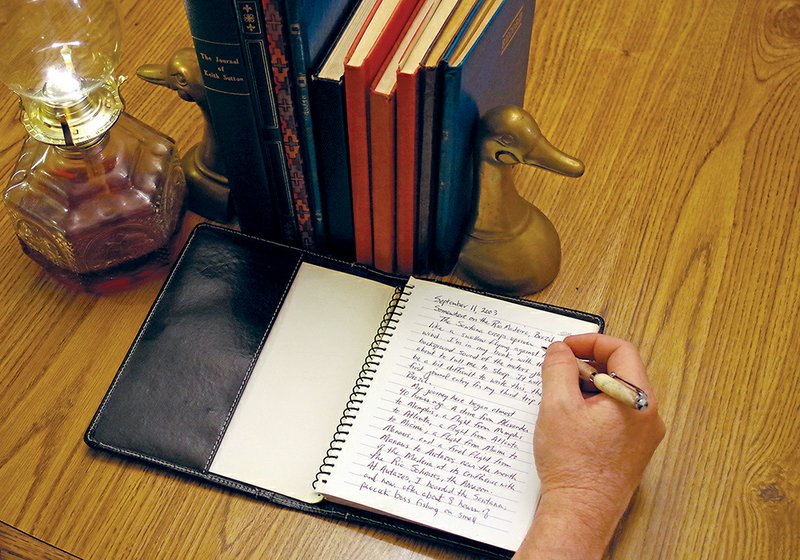They don’t look like special books. Their tattered pages are dog-eared and yellow. The scribbling inside is hard to read beneath the streaks of dirt and faded ink. The stories they contain are pretty drab stuff — at least most people would think so. Yet they are the most precious books in my library.
They are books of travel and adventure, books of joy and sadness. Inside each one are treasured memories, chronicles of triumphs and disappointments, recitals of feelings and emotions. They are albums of my uncommonly common life afield, a legacy to my children and their children. They are my outdoor journals.
On the face of it, keeping a journal may seem like a rather inconsequential piece of busyness. But there are good reasons why I started writing journals.
Ego is a part of it, I suppose. I hope someday my six sons will want to follow the trails I’ve taken, to hunt the fields and forests I love. Perhaps they’ll want to discover what really made me tick, my thoughts and fancies; and if they do, my journals will serve to guide them.
Ego isn’t the whole of it, however.
I use the notes in my journals as jumping-off points for ideas and background material in the stories I write. They help me relocate that special secluded thicket where cottontails are thick as August blackberries. They tell me how many ducks I harvested last winter, what types they were and the type of weather on the days I took them. They help me remember how long it takes to get from this point to that and the name of the greasy-spoon restaurants that serve good barbecue. They tell me when bears can be seen with their cubs in the river bottoms and when elk are bugling in the mountains.
But these aren’t the real reasons why I keep journals, either. They aren’t reporter’s notes or travel guides or address books. They are more than that.
Each journal is something special to warm my heart and mind when each season ends. I want to be able to really savor my experiences outdoors because, regrettably, they are harder to come by every year. My journals let me look back with a clarity of memory better than that which nature gave me.
Exactly which day my son killed his first limit of rabbits or where I shot a turkey in the mountains may not seem too important to me as I enter it in my journal. But when I’m wiggling my toes in front of the fireplace and sleet is scratching bony fingers on the window pane, I can pick up one of these books and stir old ashes, warming myself with the fire beneath.
You need not be a writer to keep a journal. There’s no need to be creative, no need to be philosophical. Just sit down with paper and pencil, and write what happened. Different pursuits demand different kinds of notes, and each person should keep track of things that please and help him or her. But I urge you not to forget those special moments. Keeping a journal gives you time to think about the day before letting go. What has the day held? Why was it memorable?
Here’s a bit from one entry several years ago: “We hunted the woodlot down on the farm. We were there before the sun came up, and when the first rays broke over the horizon and cast a warm glow on the treetops, the squirrels started moving. Matthew killed the first one — his first ever — at a quarter to 7, and we had enough for breakfast and were heading home to clean them by a quarter to 9. Served with hot biscuits, gravy and scrambled eggs, they were, Matt said, a meal fit for a king!”
It means nothing to you, but to me it is a priceless memory from the family album. It was the day one of my sons bagged his first squirrel. Had I not written it down at the time, that moment might have mixed with others until it was impossible to remember where it belonged. Now, the re-creation in my mind will be so vivid that the memory is nearly as enjoyable as the actual experience.
You may want to write about everything important that happens to you every day, or you may narrow your focus and write only about special moments or very specific aspects of your life — your vacations, your canoeing trips, days spent fishing or hunting, or times outdoors with your kids. You may want to keep one journal or several. You may want to draw or paint in your journal, or you may not. You may prefer to focus on experiences, or choose instead to write about the feelings your experiences evoke.
Remember this, above all things: Your journal should be what you want it to be. If someone tells you, “A journal is nothing if it does not encompass the writer’s deepest, most-personal feelings,” then that person is wrong. If someone says, “A journal is meant to reflect a person’s entire life; therefore, you must always write with that in mind,” then that person, too, is wrong. A person cannot tell you how to create a journal any more than one might tell an artist what brush strokes and pigments he must use to create a painting. Release yourself from all thoughts of what a journal should be, and create it as you want it to be. Be spontaneous. Be uninhibited. Be yourself.
My journals are as much a part of my trips afield as my rods and guns. My journals are cherished friends, and I will treasure them all the more as the years go by.
Perhaps, if I am fortunate, someone will enjoy reading them when I am gone.
